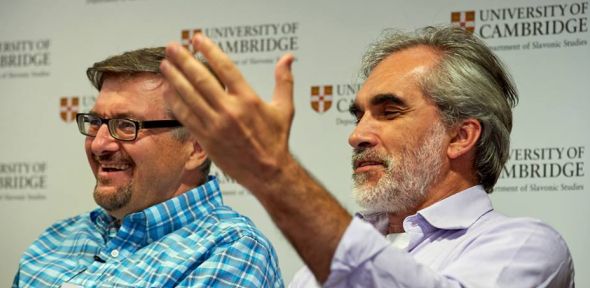
Cambridge Ukrainian Studies hosts regular international conferences and symposia that seek to advance the field of Ukrainian Studies and to promote intellectual exchange about Ukraine around the world.
2025
Firewalling the Future: The World in 2025 and Beyond
As the global order faces unprecedented stress, and as Russia's military aggression against Ukraine enters its twelfth year, Europe stands at the edge of a significant transformation. In this major conference, co-hosted with Cambridge's Centre for Geopolitics, we examined Ukraine's present path through the complexities of war and reconstruction and offered the Cambridge community a critical platform to examine the future. With a focus on countering regional autocracies and fostering democratic resilience, the event invited high-level participants to refine and shape scenarios into actionable insights for policy and advocacy.
Read our policy papers here, published by the Future of Ukraine Initiative.
2018
Engaging Multilinguality: Language, Identity and National Cohesion in Ukraine
Academic discussions about language politics in Ukraine tend to centre on questions of linguistic space rather than linguistic subject – on the multilingualism of Ukrainian territory rather than the ‘multilinguality’ of a Ukrainian citizen. This predominant approach often invites tired exchanges about Ukrainophone-Russophone, west-east regional divisions, which the Maidan Revolution and the ongoing Russian-Ukrainian armed conflict have urgently called into question. On 19 October 2018, the project Multilingualism: Empowering Individuals, Transforming Societies (MEITS), which is funded by a grant from the UK Arts and Humanities Research Council, is partnering with Cambridge Ukrainian Studies to direct more attention to the position of the multilingual subject in Ukrainian society – past, present and future.
At an international conference in Trinity College, Cambridge, a group of leading scholars across the disciplines of the humanities and social sciences will consider such questions as:
- How does our understanding of Ukraine change when we frame the evolution of the modern Ukrainian national project as, among other things, a story of individuals becoming multilingual? As a story of scholars documenting the language of the peasantry, of poets learning the dominant language of empire, of national minorities mastering the state language, of politicians acquiring the lingua franca of a globalising economy?
- How have multilingual subjects been represented in Ukrainian cultural and political discourse since the eighteenth century?
- To what extent and in what ways, if at all, can such disparate events as the Valuev Circular, the Ukrainian People’s Republic, the early Soviet ‘Executed Renaissance’, and the current war in eastern Ukraine be considered functions of the presence or absence of multilinguality in Ukraine?
- Is language diversity better understood as a benefit or an obstacle to state- and nation-building in Ukraine?
Featured speakers include Timofey Agarin, Laada Bilaniuk, Olenka Bilash, Vitaly Chernetsky, Taras Koznarsky, Natalia Kudriavtseva, Volodymyr Kulyk, Viktoria Sereda, Myroslav Shkandrij and Alina Zubkovych.
This conference led to a special issue of the Journal of Soviet and Post-Soviet Politics and Society (20:1, 2020) on 'Ukraine's Multilingualism' edited by Rory Finnin and Ivan Kozachenko. Read Finnin and Kozachenko's open-access introduction here.
2017
Ukraine and the Challenges of International Law
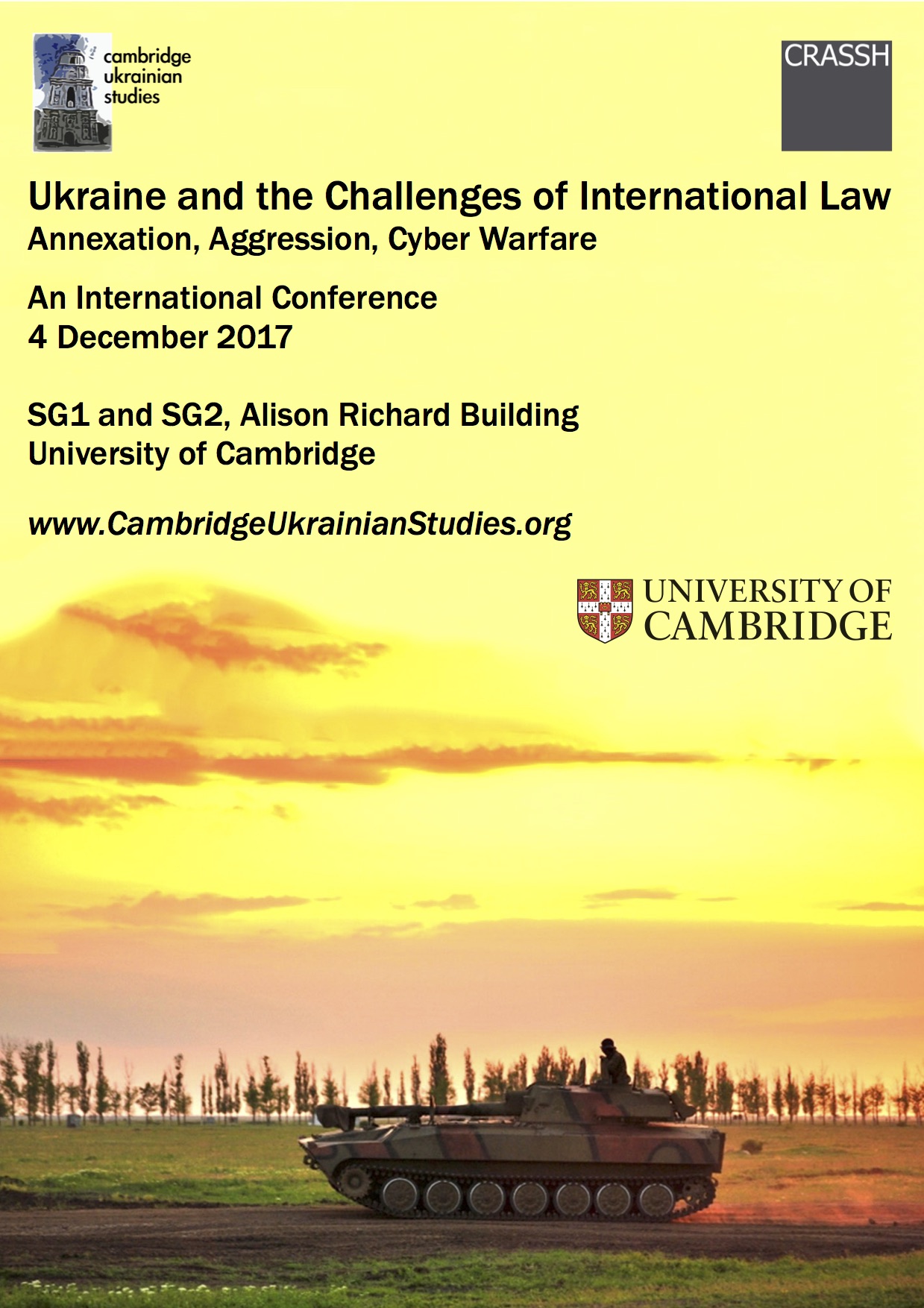
On 4 December 2017 Cambridge Ukrainian Studies and the Centre for Research in the Arts, Social Sciences and Humanities (CRASSH) hosted the international conference Ukraine and the Challenges of International Law: Annexation, Aggression, Cyber Warfare. The conference addressed the crises in Ukraine -- the annexation of Crimea, the war in eastern Ukraine, and cyber attacks against Ukraine’s infrastructure -- and the major implications that they have had for international law. The event brought together scholars, international lawyers, civic activists, and practitioners in an attempt to answer these critical questions: How can international law help us make sense of the developments in Ukraine since February 2014? What language can and must we use in our discussions of these developments? How have these crises, in their turn, affected the system of international law itself?
2017
Crimea: Centre of Gravity in the Black Sea
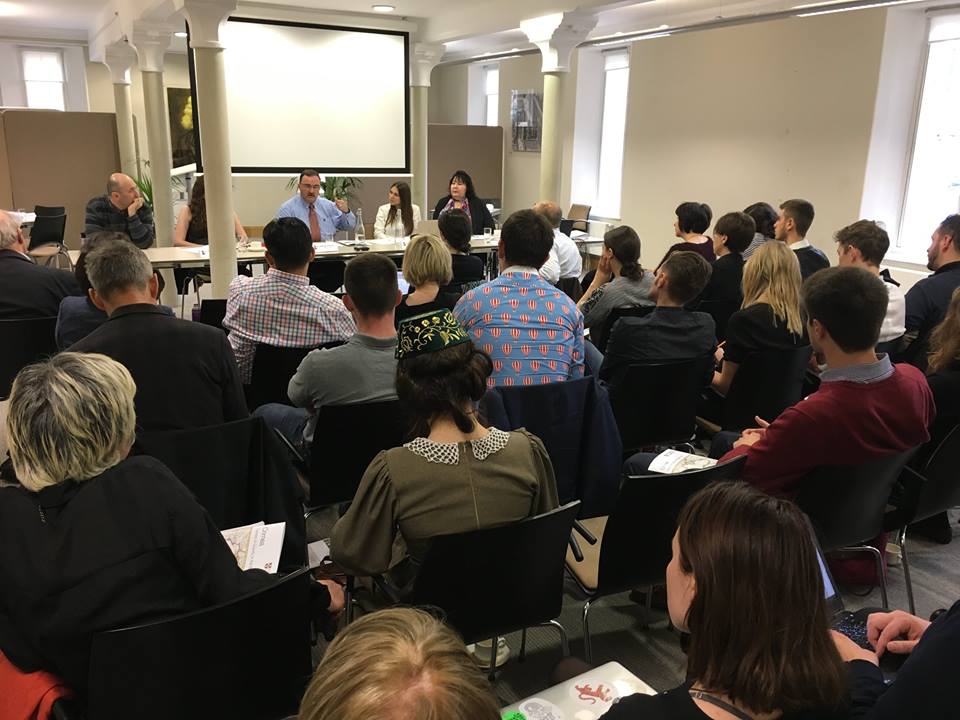
In 2014 Ukraine’s Autonomous Republic of Crimea dominated headlines around the world. Since then it has largely receded from view – despite an ongoing Russian military build-up on the peninsula and crackdowns on Crimean Tatar civil society. On 21 April 2017 the international workshop ‘Crimea: Centre of Gravity in the Black Sea’ returned the peninsula and its environs to the centre of attention.
The event was an exciting collaboration between Cambridge Ukrainian Studies and Black Sea Networks, a research project at Columbia University led by Professor Valentina Izmirlieva.
2015
Past as Prelude: Polish-Ukrainian Relations in the Twenty-First Century
An international conference seeking to develop new directions for the complex relationship between Poland and Ukraine, which has become more important than ever in the wake of Russia’s annexation of Crimea and the ongoing war in eastern Ukraine.
Speakers included Michał Boni, Norman Davies, Ola Hnatiuk, Yaroslav Hrytsak, Paweł Kowal, Serhii Plokhii, Mykola Riabchuk, Sławomir Sierakowski, Frank Sysyn, and Karolina Wigura, among others.
2014
Ukraine and the Global Information War
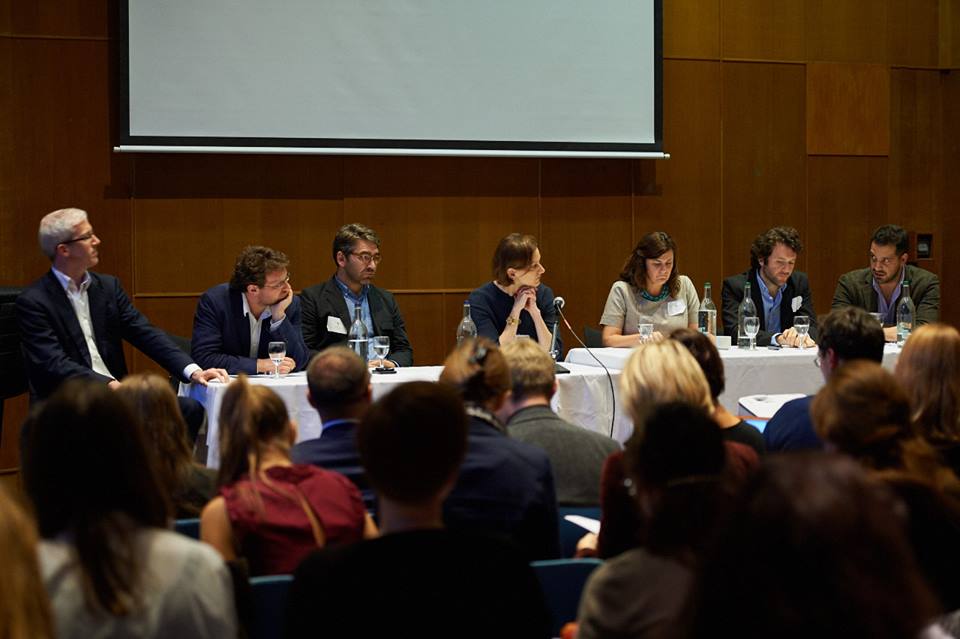
Held in partnership with the Legatum Institute, this Cambridge Ukrainian Studies international conference explored the dynamics between the politics of representation and international security through the lens of the geopolitical tumult in Ukraine, or what might be termed 'MCD' (Maidan-Crimea-Donbas).
It posited that MCD marks a critical and instructive juncture in the evolution of modern journalistic practice, featuring, among other things, a burgeoning social 'media-ization' of the news and an extraordinary collision between state propaganda and public ignorance of a country in crisis. The conference sought to examine the civic, Internet-based and crowd-sourced media initiatives that have accordingly emerged as alternatives to state and corporate media outlets in Ukraine and beyond.
2013
Making and Remaking History: A Symposium on Mykhailo Hrushevsky
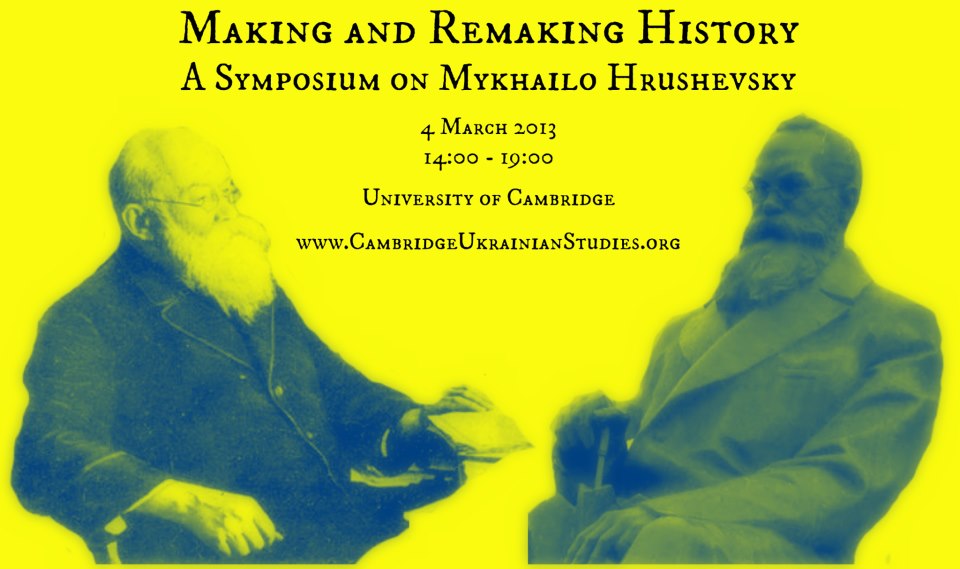
Mykhailo Hrushevsky was a historian of genius, a man who irrevocably changed our understanding of Eastern Europe. How does this change resonate today? In what ways has the scholarship of Mykhailo Hrushevsky influenced cultural memory and historical thought and practice in Ukraine, Russia, Poland and beyond?
In the best traditions of the symposium, a group of international scholars addressed these questions in free, informal conversation. The discussion was divided into two parts, each exploring different aspects of Hrushevsky's role in 'unmaking' Imperial Russia and 'unmaking' the Polish-Lithuanian Commonwealth. The event culminated in a presentation to mark the launch of the English-language History of Ukraine-Rus', Volume 6: Economic, Cultural, and National Life in the 14th to 17th Centuries, published by the Canadian Institute of Ukrainian Studies Press.
2011
Independent Ukraine: Twenty Years On
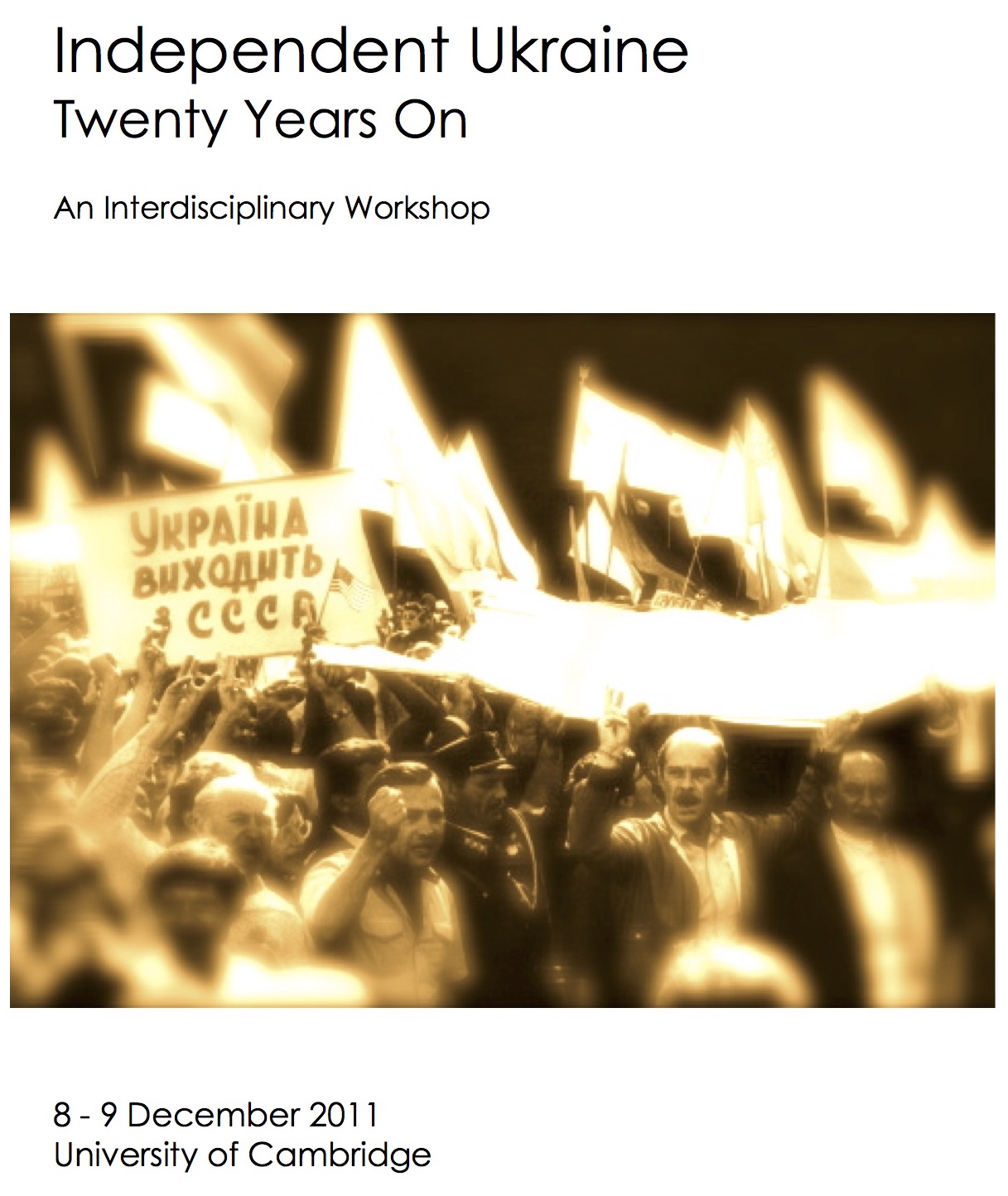
On 8-9 December 2011, a group of noted international scholars convened at the University of Cambridge to chart Ukraine's complex trajectory since the dissolution of the Soviet Union. Focusing on the concept and the challenge of independence, the participants explored the ever-evolving opportunities -- and dangers -- facing the largest country within Europe.
The event sought to offer a multi-faceted and comparative analysis of today's Ukraine by orienting discussion broadly on the notion of independence, in all its senses. What did 'independence' mean for the Ukrainian electorate in 1991? What does it mean today? In what ways is the country politically, economically, and culturally free to pursue its own interests? Does this independence conduct or inhibit democratic freedom(s)? Does Ukraine's pivotal geopolitical position -- its 'inbetweeness' -- impose by necessity a condition of dependency? How is 'independence' invoked in the discursive spheres of Ukrainian politics, economics, and culture? How has it influenced the representation of Ukraine's past -- and future?
A Hidden History of Soviet Cinema: The Legacy of Ihor Savchenko
Sponsored by Cambridge Ukrainian Studies, this symposium brought together scholars from Ukraine, Russia, Germany, the United Kingdom, and the United States to discuss diverse oeuvre of filmmaker Ihor Savchenko (1906-1950), a prolific and influential near contemporary of Dovzhenko and Eisenstein whose body of work remains little known in the West.
Born in Vinnytsia, Ukraine, Savchenko started his filmmaking career in Baku before moving to work in major studios in Moscow and Kyiv. His films include the first Soviet musical, light romantic comedies, wartime epics, and controversial biopics. Among the students in his directing master class at the All-Union State Institute of Cinematography (VGIK) were some of the most celebrated filmmakers of the post-Stalin era: Marlen Khutsiev, Sergei Parajanov, Aleksandr Alov and Vladimir Naumov.




